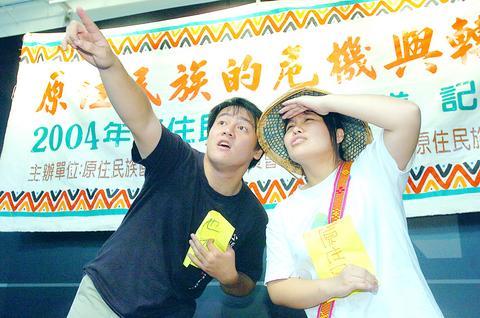Several Aboriginal social groups, including the Taiwan Indigenous Communication Association, announced yesterday that next month they would hold a series of forums for Aborigines across the nation on the possible establishment of nation-to-nation relations with the government.
The discussion series, called "Forum for Austronesian Indigenous Peoples," will include five discussion sessions around the country involving local Aboriginal leaders and representatives. Each session will cover issues related to the definition and practical enactment of sovereignty for Taiwan's indigenous people. The sessions will also cover President Chen Shui-bian's (陳水扁) promise of a "semi state-to-state" partnership with Aborigines.
The forum's goal is to create a unified vision of the future of government and of relations among Aboriginal leaders, said Lin Ming-te (

PHOTO: GEORGE TSORNG, TAIPEI TIMES
"President Chen has already said that he wants to establish nation-to-nation relations with Aborigines. However, that relationship doesn't just depend on the government. Aboriginal people need to come up with a unified view of what they want those relations to be like," Lin said.
The problem in setting up nation-to-nation relations, Lin said, is that there is no representative Aboriginal organization with which the government can communicate.
"Aboriginal people have been controlled by outside forces for too long. They've forgotten how to decide things for themselves and be self-governing," Lin said.
At a press conference yesterday, Lin proposed that the Aboriginal community set up a central entity to act as a governing body for the nation's indigenous people and as a go-between for Aborigines and the government.
When asked about the role of Aboriginal legislators and the Council of Indigenous Peoples, Lin said he considered their positions compromised by party politics and election considerations. Aboriginals need non-political, grassroots representation, Lin argued.
In response, Aboriginal Legislator Liao Kuo-tung (廖國棟) said he was reluctant to rule out the council and Aboriginal lawmakers as contributors to establishing nation-to-nation relations with the government, but said he would support the idea of forming a different mechanism if the forums revealed that Aboriginal people wanted one.
The Chinese Nationalist Party (KMT) legislator, who will be hosting some of the forum's discussions, also announced that he and his fellow Aboriginal legislators would force votes on the Aboriginal Basic Law (
Until the bills are passed, Liao said, he and the other Aboriginal legislators would stall votes on all other issues.
The draft of the Aboriginal Basic Law outlines a structure for autonomy for Aborigines. The changes to the Land Law are designed to guarantee land rights to Aboriginals. Both bills failed to pass in the last legislative sitting.
The forum comes in the wake of protests by Aborigines from across Taiwan about recent remarks by Vice President Annette Lu (呂秀蓮). However, forum organizers said that planning for the forum had been going on for a while.

Nipah virus infection is to be officially listed as a category 5 notifiable infectious disease in Taiwan in March, while clinical treatment guidelines are being formulated, the Centers for Disease Control (CDC) said yesterday. With Nipah infections being reported in other countries and considering its relatively high fatality rate, the centers on Jan. 16 announced that it would be listed as a notifiable infectious disease to bolster the nation’s systematic early warning system and increase public awareness, the CDC said. Bangladesh reported four fatal cases last year in separate districts, with three linked to raw date palm sap consumption, CDC Epidemic Intelligence

The manufacture of the remaining 28 M1A2T Abrams tanks Taiwan purchased from the US has recently been completed, and they are expected to be delivered within the next one to two months, a source said yesterday. The Ministry of National Defense is arranging cargo ships to transport the tanks to Taiwan as soon as possible, said the source, who is familiar with the matter. The estimated arrival time ranges from late this month to early next month, the source said. The 28 Abrams tanks make up the third and final batch of a total of 108 tanks, valued at about NT$40.5 billion

Two Taiwanese prosecutors were questioned by Chinese security personnel at their hotel during a trip to China’s Henan Province this month, the Mainland Affairs Council (MAC) said yesterday. The officers had personal information on the prosecutors, including “when they were assigned to their posts, their work locations and job titles,” MAC Deputy Minister and spokesman Liang Wen-chieh (梁文傑) said. On top of asking about their agencies and positions, the officers also questioned the prosecutors about the Cross-Strait Joint Crime-Fighting and Judicial Mutual Assistance Agreement, a pact that serves as the framework for Taiwan-China cooperation on combating crime and providing judicial assistance, Liang

A group from the Taiwanese Designers in Australia association yesterday represented Taiwan at the Midsumma Pride March in Melbourne. The march, held in the St. Kilda suburb, is the city’s largest LGBTQIA+ parade and the flagship event of the annual Midsumma Festival. It attracted more than 45,000 spectators who supported the 400 groups and 10,000 marchers that participated this year, the association said. Taiwanese Designers said they organized a team to march for Taiwan this year, joining politicians, government agencies, professionals and community organizations in showing support for LGBTQIA+ people and diverse communities. As the first country in Asia to legalize same-sex